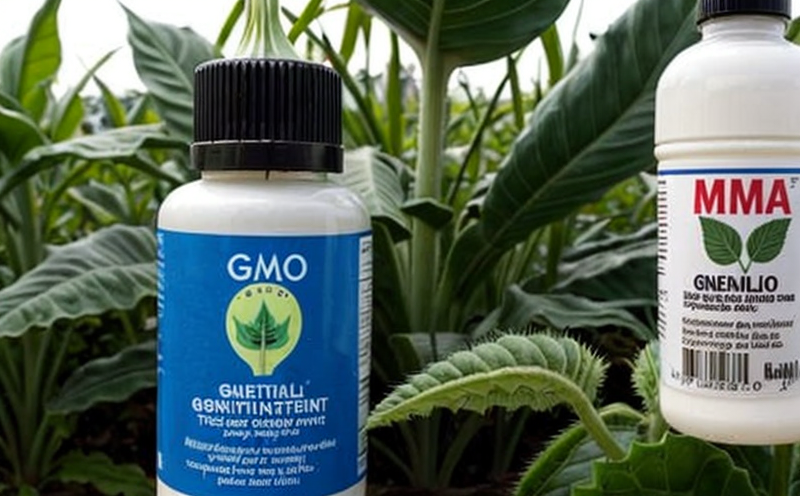ISO 29254 GMO Detection in Animal-Origin Foods
The International Organization for Standardization (ISO) has developed ISO 29254, which provides a robust framework for detecting the presence of genetically modified organisms (GMOs) in animal-origin foods. This standard is particularly critical given the growing global demand for transparent and reliable food safety and traceability systems.
The detection of GMOs in animal-origin foods not only ensures compliance with regulatory requirements but also supports consumer confidence and trust in the food supply chain. With increasing awareness about genetically modified ingredients, there is a significant need to accurately identify and monitor their presence across various stages of production and distribution.
Animal-origin foods such as meat, milk, eggs, and other by-products are often processed from feed that may contain GMOs. Ensuring the absence or appropriate labeling of GMOs in these products is essential for maintaining consumer trust and compliance with international standards like EU Regulation 1829/2003.
The methodology prescribed in ISO 29254 involves a combination of sample preparation, extraction techniques, and analytical tools that can detect even trace amounts of GMOs. The standard specifies the use of polymerase chain reaction (PCR) technology for nucleic acid amplification and subsequent detection.
For quality managers responsible for food safety and compliance, this service ensures that all stages of production are monitored rigorously. This includes not only raw materials but also processed products destined for the market. The standard is particularly useful for companies involved in animal husbandry and feed manufacturing as it helps them maintain a high level of traceability.
Compliance officers will find ISO 29254 invaluable when conducting internal audits or responding to regulatory inspections. It provides clear guidelines on how to identify and report the presence of GMOs, ensuring that companies are prepared for any scrutiny. For R&D engineers working in this sector, this standard offers a benchmark against which new technologies can be validated and optimized.
The service also supports procurement departments by providing detailed information on ingredient sourcing and supplier audits. By using ISO 29254, organizations can ensure that their suppliers are meeting the highest standards for GMO-free or labeled products.
Why It Matters
The importance of detecting GMOs in animal-origin foods cannot be overstated. Consumers have increasing concerns about food safety and the ethical implications associated with genetically modified organisms. Regulatory bodies worldwide are implementing strict regulations to ensure transparency and accuracy in labeling.
- Consumer Trust: Accurate detection ensures that consumers can make informed decisions based on their preferences regarding GMOs.
- Regulatory Compliance: Adherence to standards like ISO 29254 helps companies avoid legal penalties and reputational damage associated with non-compliance.
- Ethical Considerations: Ensuring the integrity of food products aligns with ethical principles, particularly in countries where there is a strong consumer movement against GMOs.
The standard also supports sustainable practices by promoting transparency and traceability throughout the supply chain. This helps reduce waste and ensures that resources are used efficiently, contributing to a more sustainable food system.
By using ISO 29254, companies can enhance their reputation as leaders in food safety and sustainability, thereby attracting more customers and building stronger relationships with stakeholders.
Quality and Reliability Assurance
The quality and reliability of the results obtained through ISO 29254 are paramount. The standard ensures that all testing processes are conducted under controlled conditions to minimize errors and variations. This is achieved by following strict protocols for sample preparation, extraction, and analysis.
Sample preparation involves thorough homogenization of the food matrix to ensure a representative sample for GMO detection. Extraction techniques used include organic solvent-based methods or column chromatography, which help in isolating DNA from other cellular components.
The analytical tools employed are highly sensitive and specific, such as real-time PCR machines capable of detecting minute quantities of target sequences. These instruments provide precise quantification data that can be used to determine the level of GMO contamination.
The reliability of results is further enhanced by rigorous quality control measures, including regular calibration of equipment and proficiency testing with reference materials provided by recognized organizations.
For companies looking to implement ISO 29254 in their operations, this service offers comprehensive training and support. This includes guidance on selecting appropriate sample types, optimizing extraction protocols, and interpreting analytical outputs accurately.
The standard also emphasizes the importance of maintaining detailed records throughout the testing process. These documents serve as evidence of compliance with regulatory requirements and can be shared during audits or inspections.
Environmental and Sustainability Contributions
- Reduction in Waste: By ensuring that only non-GMO ingredients are used, this service helps minimize waste associated with discarded products containing prohibited GMOs.
- Sustainable Resource Use: The standard encourages the use of sustainable practices throughout the supply chain, from cultivation to processing, which can lead to more efficient resource utilization.
- Biosecurity Measures: Ensuring that animal-origin foods do not contain unauthorized GMOs helps prevent potential risks to biodiversity and ecosystem health.
The detection of GMOs in animal-origin foods also supports efforts towards sustainable agriculture. By promoting transparency and traceability, the standard encourages stakeholders to adopt environmentally friendly practices, such as organic farming methods or regenerative agriculture techniques.
Furthermore, this service contributes to global food security by ensuring that food products are safe, reliable, and free from unintended contaminants. This is particularly crucial in regions where access to clean water and nutritious food is limited.





